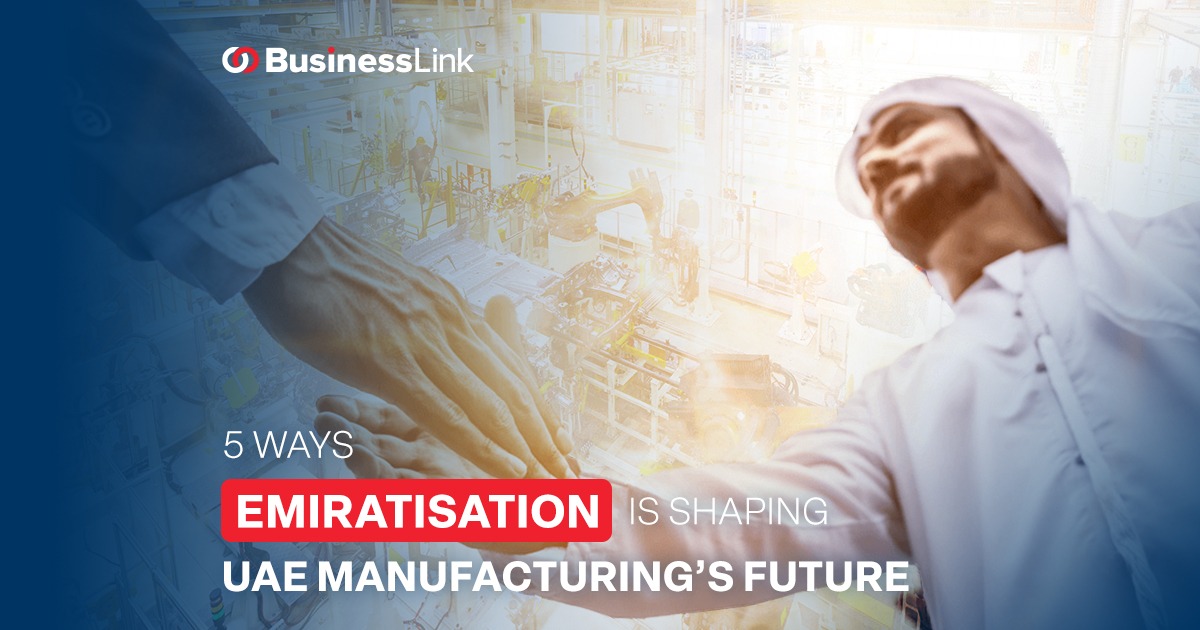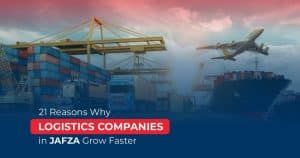Did you know the UAE’s manufacturing sector is a powerhouse, contributing over 14% to the GDP and projected to grow 6% annually? The government’s Emiratisation Initiatives aim to create 75,000 jobs for UAE nationals in this thriving sector by 2026.
Curious how this strategic focus on local talent and advanced technology is transforming the UAE into a global manufacturing hub? Discover the key industries and strategies driving this remarkable success story.
Table of contents1. The Power of Emiratisation: Driving Growth in the UAE’s Manufacturing Sector 2. 75,000 Opportunities: Emiratisation’s Impact on UAE’s Workforce and Economic Growth 3. Technology and Talent: Fueling the UAE’s Manufacturing Boom Through Emiratisation 4. Key Industries Transformed: Emiratisation’s Impact on UAE Manufacturing 5. The Future of Emiratisation: Building a Sustainable and Skilled Workforce in the UAE 6. The Summary 7. FAQ’s |
The Power of Emiratisation: Driving Growth in the UAE’s Manufacturing Sector
Emiratisation is driving growth in the UAE’s manufacturing sector by promoting economic diversification and job creation.
This initiative integrates UAE nationals into the private sector, enhancing local talent and boosting productivity.
Emiratisation supports the government’s vision of reducing reliance on expatriate labor, and building a sustainable economy.
With a focus on advanced technology and innovation, Emiratisation is transforming the UAE into a global manufacturing powerhouse.
The initiative aims to create 75,000 jobs for UAE nationals, strengthening the country’s competitive edge on the global stage.
Emiratisation not only attracts investment but also fosters a skilled workforce, ensuring long-term growth and sustainability in the manufacturing industry.
75,000 Opportunities: Emiratisation’s Impact on the UAE’s Workforce and Economic Growth
Ambitious National Goal
Policies in the UAE are targeting the creation of 75,000 jobs for UAE nationals in the private sector by 2026, demonstrating the government’s strong commitment to empowering its citizens.
Private Sector Participation
Initiatives are actively encouraging private companies to hire and train UAE nationals, fostering a diverse and inclusive workforce.
Skills Development and Career Paths
Emiratisation programs not only create job opportunities but also provide training and mentorship, equipping UAE nationals with the skills needed to thrive in various sectors.
Reduced Reliance on Expatriate Labor
By increasing the participation of UAE nationals in the workforce, Emiratisation contributes to a more sustainable and self-sufficient economy.
Long-Term Economic Benefits
Focus on building a skilled and capable local workforce will not only create immediate job opportunities but also ensure long-term economic growth and prosperity for the UAE.
Technology and Talent: Fueling the UAE’s Manufacturing Boom Through Emiratisation
Skilled Workforce Development
Emiratisation is revolutionizing the UAE’s manufacturing sector by nurturing a highly skilled local workforce through comprehensive education and training programs.
This strategy ensures that UAE nationals acquire the technical expertise essential for driving innovation and operational efficiency in advanced manufacturing roles.
Technological Advancements
The UAE’s substantial investment in cutting-edge technologies such as AI, robotics, and 3D printing is significantly enhancing manufacturing processes.
These technological advancements are complemented by initiatives, which effectively integrate local talent into these high-tech fields, thereby boosting productivity and product quality.
Synergy of Talent and Technology
The strategic combination and technological adoption creates a dynamic synergy that propels the UAE’s manufacturing boom.
This fusion of skilled Emirati professionals with state-of-the-art technology positions the UAE at the forefront of global manufacturing competition.
Industry 4.0 Integration
Emirati professionals are leading the charge in adopting Industry 4.0 technologies, which streamline operations and foster innovation.
This integration not only drives efficiency but also ensures the UAE’s manufacturing sector remains competitive on a global scale.
Global Competitiveness and Sustainable Growth
By aligning Emiratisation with technological advancements, the UAE attracts foreign investment and supports sustainable growth.
This forward-thinking approach ensures long-term success and positions the UAE as a global leader in manufacturing.
Key Industries Transformed: Emiratisation’s Impact on UAE Manufacturing
Metals and Metal Products
Emiratisation boosts opportunities for UAE nationals in aluminum production & fabricated metals, crucial for construction, automotive, and aerospace.
Food and Beverages
Rising domestic demand and export potential drive sector expansion, with Emiratisation creating diverse career paths in food processing, dairy, beverages, and packaging.
Machinery and Equipment
Emiratisation ensures UAE nationals contribute to this growing industry, producing machinery, electrical equipment, and transport equipment for local and international markets.
Construction Materials
Emiratisation increases local participation in the booming construction sector, producing cement, concrete, glass, & ceramics.
Healthcare & Pharmaceuticals
Emiratisation fosters a skilled workforce in this expanding sector, supporting the UAE’s goal of becoming a regional healthcare hub.
The Future of Emiratisation: Building a Sustainable and Skilled Workforce in the UAE
Long-Term Vision
Emiratisation aims to create a self-reliant and knowledge-based economy by nurturing a highly skilled Emirati workforce capable of leading various industries.
Continuous Skill Development
Ongoing investment in education and training programs ensures that Emirati talent remains adaptable and equipped to meet evolving industry demands.
Promoting Innovation and Entrepreneurship
Emiratisation policies promote a climate of innovation and self-reliance among UAE citizens, motivating them to launch businesses and contribute to a diversified economy.
Attracting and Retaining Top Talent
By offering competitive salaries, benefits, and career development opportunities, in addition it helps to attract and retain top Emirati talent in the private sector.
A Shared Responsibility
The success of Emiratisation hinges on a partnership between the government, the private sector, and educational institutions to build a supportive framework that nurtures and empowers Emirati professionals.
The Summary
The UAE’s future is bright, driven by Emiratisation. This initiative fosters local talent, embraces innovation, and positions businesses for success.
Partner with Business Link UAE to navigate this transformative landscape and unlock your full potential in the thriving UAE economy.
FAQ’s
- What is Emiratisation?
Emiratisation is crucial for the UAE as it reduces reliance on foreign labor, creates jobs for nationals, and fosters a skilled, diversified economy.
- Why is Emiratisation important for the UAE?
Emiratisation is crucial for the UAE’s long-term economic development and sustainability.
It helps reduce reliance on expatriate labor, creates job opportunities for UAE nationals, fosters a skilled and capable workforce, and contributes to economic diversification.
- How does Emiratisation benefit UAE nationals?
Emiratisation provides UAE nationals with increased access to job opportunities, career development, and skill enhancement.
It empowers them to actively participate in and contribute to the nation’s economic growth and development.
- How does Emiratisation benefit businesses in the UAE?
By helping businesses tap into a pool of talented and motivated local workforce, enhance their corporate social responsibility image, and gain access to government incentives and support programs.
It also contributes to long-term sustainability and stability by reducing dependence on foreign labor.




